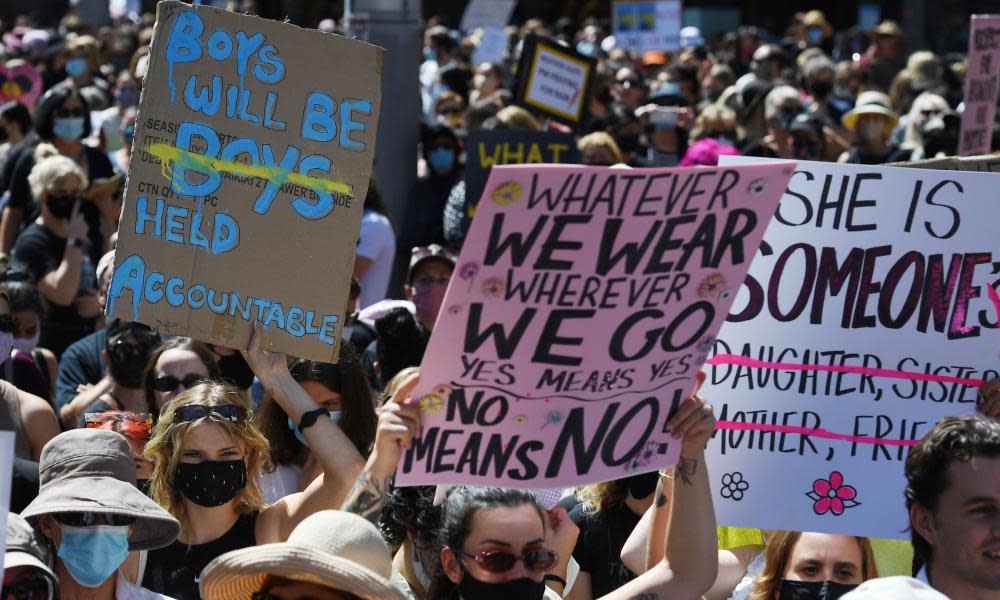Affirmative sexual consent: what the NSW law reforms mean and how other states compare

The New South Wales government on Tuesday announced it would change the laws around sexual consent to better deliver justice to victims and survivors of sexual assault.
The changes come after a law reform commission review and a campaign by advocates such as Saxon Mullins, who was the subject of a major Four Corners investigation.
What is proposed in NSW?
The NSW government plan to adopt an affirmative consent model. This means a person must do or say something to affirm they have consent before sex occurs.
The reforms will mean:
(a) a person does not consent to sexual activity unless they said or did something to communicate consent; and
(b) an accused person’s belief in consent will not be reasonable in the circumstances unless they said or did something to ascertain consent.
They will also retain the current meaning of consent as a free and voluntary agreement, while adding that it must be present when sex occurs. They will also affirm a person’s right to withdraw consent at any point; make clear that if someone consents to one sexual act, it doesn’t mean they’ve consented to other sexual acts; clarify the definitions of “sexual intercourse”, “sexual touching” and “sexual act”; and clarify that a defendant cannot rely on self-induced intoxication to show they were mistaken about consent.
The government says it also plans to introduce five new jury directions for judges to give at trial to address common misconceptions about consent and ensure a victim’s evidence is assessed fairly and impartially.
The affirmative consent model is generally designed to overcome a common hurdle in rape and sexual assault trials in some jurisdictions – that an alleged offender had “reasonable grounds” for believing the complainant had consented.
The laws are set to be introduced into parliament later this year, between September and December.
How are these laws different from current laws?
Under current NSW law, a person commits sexual assault if they know the other person is not consenting, if they are “reckless as to whether” they consent, or there are no reasonable grounds for believing there was consent.
This was a key point in the case of Luke Lazarus, who was accused of raping Mullins. He was found guilty at his first trial, overturned the matter on appeal, and was then found not guilty during a retrial when judge Robyn Tupman found he had a “genuine belief” that Mullins consented. That ruling was later overturned but the court of criminal appeal did not order another trial.
How are these proposals being received?
Related: Barriers to justice: 'We are still governed by the idea that women lie about sexual assault'
The proposed NSW laws were hailed by Dr Rachael Burgin, director at Rape and Sexual Assault Research and Advocacy, as “leading the country”.
Mullins celebrated the announcement on Tuesday, and thanked survivors who had worked to change the law, saying that “I can never go back and change the outcome of my case, but we have changed how some stories will end.”
What is the situation in other states?
Experts have previously said Tasmania had the “gold standard” in Australia (though that is contested).
Victoria was considered to have strong consent laws, which required communicative consent between parties, but the office of public prosecutions is concerned about how they have been applied in some cases.
Queensland strengthened consent laws in March, but advocates believed the changes did not go far enough. The changes included principles such as silence doesn’t amount to consent, consent once given can be withdrawn, and the self-intoxication of a defendant cannot be relied upon to show that they were mistaken about whether or not consent was given.
Western Australia has similar laws to those in Queensland prior to the recent amendments, meaning a “mistake of fact” defence remains open. This is seen as problematic as it allows those accused of rape to argue they had an honest and reasonable belief of consent but were mistaken.
South Australia and the Northern Territory law both refer to a “free and voluntary agreement”. The ACT government is reviewing its laws, after it was previously found it was the only state or territory without a statutory definition of consent.
How does the law in Australia compare with laws internationally?
Pretty well, according to this piece published in March. It found that Australia is one of the world’s most progressive jurisdictions, on par with countries such as England, Wales, New Zealand and Canada.
In Europe, a recent Amnesty International analysis found only 12 out of 31 countries had consent-based definitions of rape. This includes the UK, Ireland, Sweden, Denmark, Iceland, Germany, Belgium, Luxembourg, Malta, Greece, Croatia and Cyprus.
Sweden lists no exceptions, removing all defences like the “reasonable steps” rule that still exists in some Australian jurisdictions.

 Yahoo News
Yahoo News 
